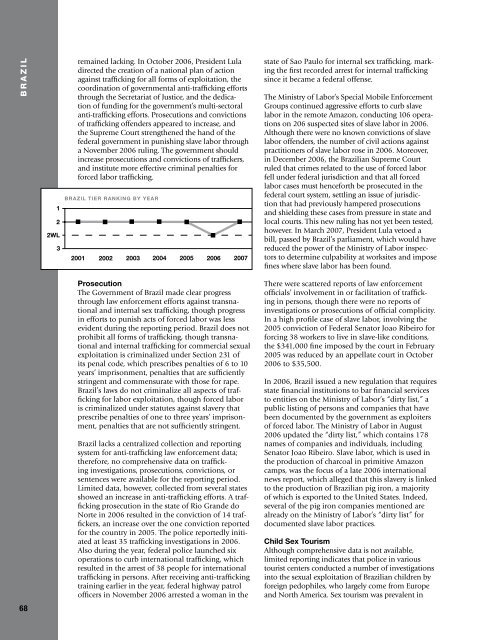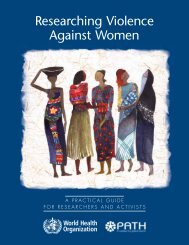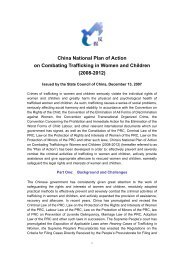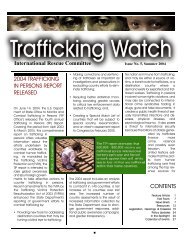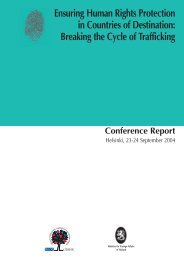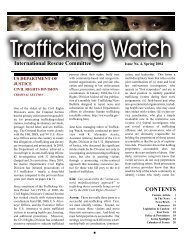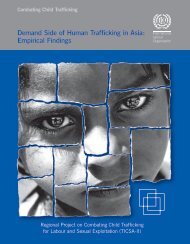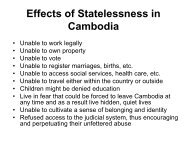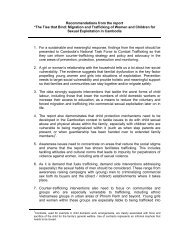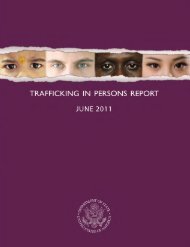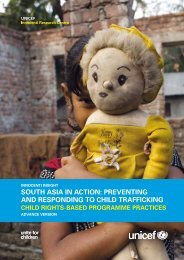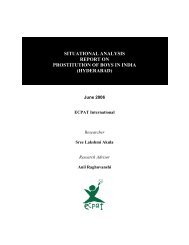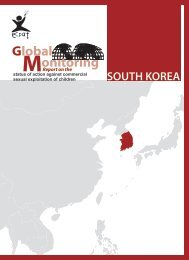2007 Trafficking in Persons Report - Center for Women Policy Studies
2007 Trafficking in Persons Report - Center for Women Policy Studies
2007 Trafficking in Persons Report - Center for Women Policy Studies
You also want an ePaper? Increase the reach of your titles
YUMPU automatically turns print PDFs into web optimized ePapers that Google loves.
B R A Z I L<br />
68<br />
rema<strong>in</strong>ed lack<strong>in</strong>g. In October 2006, President Lula<br />
directed the creation of a national plan of action<br />
aga<strong>in</strong>st traffick<strong>in</strong>g <strong>for</strong> all <strong>for</strong>ms of exploitation, the<br />
coord<strong>in</strong>ation of governmental anti-traffick<strong>in</strong>g ef<strong>for</strong>ts<br />
through the Secretariat of Justice, and the dedication<br />
of fund<strong>in</strong>g <strong>for</strong> the government’s multi-sectoral<br />
anti-traffick<strong>in</strong>g ef<strong>for</strong>ts. Prosecutions and convictions<br />
of traffick<strong>in</strong>g offenders appeared to <strong>in</strong>crease, and<br />
the Supreme Court strengthened the hand of the<br />
federal government <strong>in</strong> punish<strong>in</strong>g slave labor through<br />
a November 2006 rul<strong>in</strong>g. The government should<br />
<strong>in</strong>crease prosecutions and convictions of traffickers,<br />
and <strong>in</strong>stitute more effective crim<strong>in</strong>al penalties <strong>for</strong><br />
<strong>for</strong>ced labor traffick<strong>in</strong>g.<br />
Prosecution<br />
The Government of Brazil made clear progress<br />
through law en<strong>for</strong>cement ef<strong>for</strong>ts aga<strong>in</strong>st transnational<br />
and <strong>in</strong>ternal sex traffick<strong>in</strong>g, though progress<br />
<strong>in</strong> ef<strong>for</strong>ts to punish acts of <strong>for</strong>ced labor was less<br />
evident dur<strong>in</strong>g the report<strong>in</strong>g period. Brazil does not<br />
prohibit all <strong>for</strong>ms of traffick<strong>in</strong>g, though transnational<br />
and <strong>in</strong>ternal traffick<strong>in</strong>g <strong>for</strong> commercial sexual<br />
exploitation is crim<strong>in</strong>alized under Section 231 of<br />
its penal code, which prescribes penalties of 6 to 10<br />
years’ imprisonment, penalties that are sufficiently<br />
str<strong>in</strong>gent and commensurate with those <strong>for</strong> rape.<br />
Brazil’s laws do not crim<strong>in</strong>alize all aspects of traffick<strong>in</strong>g<br />
<strong>for</strong> labor exploitation, though <strong>for</strong>ced labor<br />
is crim<strong>in</strong>alized under statutes aga<strong>in</strong>st slavery that<br />
prescribe penalties of one to three years’ imprisonment,<br />
penalties that are not sufficiently str<strong>in</strong>gent.<br />
Brazil lacks a centralized collection and report<strong>in</strong>g<br />
system <strong>for</strong> anti-traffick<strong>in</strong>g law en<strong>for</strong>cement data;<br />
there<strong>for</strong>e, no comprehensive data on traffick<strong>in</strong>g<br />
<strong>in</strong>vestigations, prosecutions, convictions, or<br />
sentences were available <strong>for</strong> the report<strong>in</strong>g period.<br />
Limited data, however, collected from several states<br />
showed an <strong>in</strong>crease <strong>in</strong> anti-traffick<strong>in</strong>g ef<strong>for</strong>ts. A traffick<strong>in</strong>g<br />
prosecution <strong>in</strong> the state of Rio Grande do<br />
Norte <strong>in</strong> 2006 resulted <strong>in</strong> the conviction of 14 traffickers,<br />
an <strong>in</strong>crease over the one conviction reported<br />
<strong>for</strong> the country <strong>in</strong> 2005. The police reportedly <strong>in</strong>itiated<br />
at least 35 traffick<strong>in</strong>g <strong>in</strong>vestigations <strong>in</strong> 2006.<br />
Also dur<strong>in</strong>g the year, federal police launched six<br />
operations to curb <strong>in</strong>ternational traffick<strong>in</strong>g, which<br />
resulted <strong>in</strong> the arrest of 38 people <strong>for</strong> <strong>in</strong>ternational<br />
traffick<strong>in</strong>g <strong>in</strong> persons. After receiv<strong>in</strong>g anti-traffick<strong>in</strong>g<br />
tra<strong>in</strong><strong>in</strong>g earlier <strong>in</strong> the year, federal highway patrol<br />
officers <strong>in</strong> November 2006 arrested a woman <strong>in</strong> the<br />
state of Sao Paulo <strong>for</strong> <strong>in</strong>ternal sex traffick<strong>in</strong>g, mark<strong>in</strong>g<br />
the first recorded arrest <strong>for</strong> <strong>in</strong>ternal traffick<strong>in</strong>g<br />
s<strong>in</strong>ce it became a federal offense.<br />
The M<strong>in</strong>istry of Labor’s Special Mobile En<strong>for</strong>cement<br />
Groups cont<strong>in</strong>ued aggressive ef<strong>for</strong>ts to curb slave<br />
labor <strong>in</strong> the remote Amazon, conduct<strong>in</strong>g 106 operations<br />
on 206 suspected sites of slave labor <strong>in</strong> 2006.<br />
Although there were no known convictions of slave<br />
labor offenders, the number of civil actions aga<strong>in</strong>st<br />
practitioners of slave labor rose <strong>in</strong> 2006. Moreover,<br />
<strong>in</strong> December 2006, the Brazilian Supreme Court<br />
ruled that crimes related to the use of <strong>for</strong>ced labor<br />
fell under federal jurisdiction and that all <strong>for</strong>ced<br />
labor cases must hence<strong>for</strong>th be prosecuted <strong>in</strong> the<br />
federal court system, settl<strong>in</strong>g an issue of jurisdiction<br />
that had previously hampered prosecutions<br />
and shield<strong>in</strong>g these cases from pressure <strong>in</strong> state and<br />
local courts. This new rul<strong>in</strong>g has not yet been tested,<br />
however. In March <strong>2007</strong>, President Lula vetoed a<br />
bill, passed by Brazil’s parliament, which would have<br />
reduced the power of the M<strong>in</strong>istry of Labor <strong>in</strong>spectors<br />
to determ<strong>in</strong>e culpability at worksites and impose<br />
f<strong>in</strong>es where slave labor has been found.<br />
There were scattered reports of law en<strong>for</strong>cement<br />
officials’ <strong>in</strong>volvement <strong>in</strong> or facilitation of traffick<strong>in</strong>g<br />
<strong>in</strong> persons, though there were no reports of<br />
<strong>in</strong>vestigations or prosecutions of official complicity.<br />
In a high profile case of slave labor, <strong>in</strong>volv<strong>in</strong>g the<br />
2005 conviction of Federal Senator Joao Ribeiro <strong>for</strong><br />
<strong>for</strong>c<strong>in</strong>g 38 workers to live <strong>in</strong> slave-like conditions,<br />
the $341,000 f<strong>in</strong>e imposed by the court <strong>in</strong> February<br />
2005 was reduced by an appellate court <strong>in</strong> October<br />
2006 to $35,500.<br />
In 2006, Brazil issued a new regulation that requires<br />
state f<strong>in</strong>ancial <strong>in</strong>stitutions to bar f<strong>in</strong>ancial services<br />
to entities on the M<strong>in</strong>istry of Labor’s “dirty list,” a<br />
public list<strong>in</strong>g of persons and companies that have<br />
been documented by the government as exploiters<br />
of <strong>for</strong>ced labor. The M<strong>in</strong>istry of Labor <strong>in</strong> August<br />
2006 updated the “dirty list,” which conta<strong>in</strong>s 178<br />
names of companies and <strong>in</strong>dividuals, <strong>in</strong>clud<strong>in</strong>g<br />
Senator Joao Ribeiro. Slave labor, which is used <strong>in</strong><br />
the production of charcoal <strong>in</strong> primitive Amazon<br />
camps, was the focus of a late 2006 <strong>in</strong>ternational<br />
news report, which alleged that this slavery is l<strong>in</strong>ked<br />
to the production of Brazilian pig iron, a majority<br />
of which is exported to the United States. Indeed,<br />
several of the pig iron companies mentioned are<br />
already on the M<strong>in</strong>istry of Labor’s “dirty list” <strong>for</strong><br />
documented slave labor practices.<br />
Child Sex Tourism<br />
Although comprehensive data is not available,<br />
limited report<strong>in</strong>g <strong>in</strong>dicates that police <strong>in</strong> various<br />
tourist centers conducted a number of <strong>in</strong>vestigations<br />
<strong>in</strong>to the sexual exploitation of Brazilian children by<br />
<strong>for</strong>eign pedophiles, who largely come from Europe<br />
and North America. Sex tourism was prevalent <strong>in</strong>


